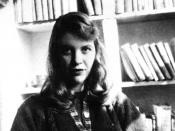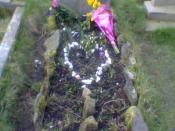Anne Sexton and Sylvia Plath were both great minds, creative individuals, and some of the greatest poetic individuals of the twentieth century. Though Anne Sexton and Sylvia Plath were great poets, they were also obsessed with death, darkness, and plagued with manic depression. They yearned for death, and both were able to achieve their life goal of dying. They're poetry is a direct result of their morbid minds and the strange obsessions they shared during they're several years of friendship.
Sylvia Plath and Anne Sexton did not pull their style, creativity and ideas out of nowhere. Both Sexton and Plath suffered troubled childhoods, Plath's father died when she was only eight, creating a life long resentment, and Sexton's father was abusive and alcoholic. There are only one or two flaws to this "reason" if you will for why Sexton and Plath used such strange and dark ideas in their poetry.
Sylvia Plath's father died when she was eight, she resented him and felt that he had betrayed her by leaving her on this earth without a father figure. Plath searched for relief from this and wanted to make her father into a person that she would have a reason to resent and dislike. For Plath this was a Nazi. Plath has many uses of nazi allusions of the holocaust, explaining the evil of Nazi's, and uses them to describe her father. In "Lady Lazarus" Plath makes a reference to a "Nazi lampshade". This reference means that the Nazi's made lampshades from the skin of dead Jew's. Throughout many of these poems, if one knows about the "method to her madness" they would now that she is creating parallels between how horrible someone like her father was, to how horrible and Nazi was.
This same aspect is also seen in "Daddy".


